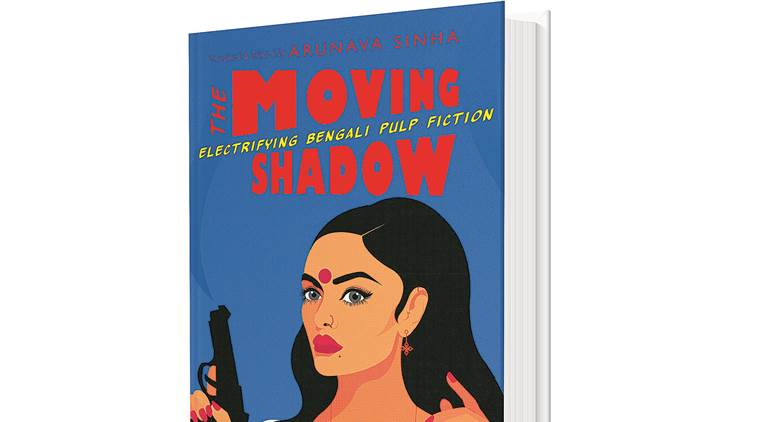Written by Samantak Das |Published: December 8, 2018 12:12:41 am
God is a Bullet
In its choice of authors and texts, an anthology of Bangla pop lit misses its target by a whisker.

Okay, full disclosure. I have known Arunava Sinha, aka Bultu (everyone knows that every Bengali has a nickname, which is often more important than the given formal name) since the time we were students at Jadavpur University, Kolkata, back in the bad old 1980s, and have admired his mission to bring Bangla writing — primarily fiction, but also poetry and some non-fiction — to a larger readership through his prolific translations ever since he set off on his crusade, about a dozen years ago. What I like most about Bultu’s translations, especially those of more popular works, is the register in which he chooses to render these texts: a kind of idiomatic, easy-flowing, not-always-strictly-grammatical Indian English, interspersed with Bangla words and phrases, that mimics the lingo of the English-educated, Kolkata-dwelling, so-called middle class, heard in school campuses and college canteens across the city.

Selected and translated by Arunava Sinha
Aleph Book Company
244 pages; Rs 499
This register has worked brilliantly, for example, in the case of Moti Nandy (1931– 2010), the great writer of sport-based fiction, whose works have found a new, not-Bangla-knowing readership, thanks to Sinha’s wonderful English translations. An entire generation of non-resident Bengalis, familiar with cultural mores but innocent of the language, is discovering its Bengali-ness through these translations, and I thank Bultu for it.
Which is where one can pick a friendly fight over the choice of authors and texts in The Moving Shadow: Electrifying Bengali Pulp Fiction. The eight authors represented in this anthology are a fair representation of the variety of what Sinha characterises (somewhat unfairly, perhaps) as “Bengali pulp”, but to someone with a smidgen of knowledge about that corner of Bangla literature smeared with “blood, gore and spirits” (p viii) some omissions stand out more vividly, with the absence of the delightfully improbable Dasyu Mohan, Sasadhar Dutta’s immortal creation, leading the list. Mohan’s absence is compensated for by the presence of the almost-equally-absurd tale of ‘The Moving Shadow’, starring Swapan Kumar’s unfailingly heroic hero, detective Dipak Chatterjee (pp 55 – 84), and Premendra Mitra’s Parashar Barma (oh, how I long to see this failed-poet-cum-successful-sleuth brought to life on screen!) in one of Mitra’s most successful tales ‘Nilam daklo Parashar Barma’ (here felicitously rendered as “Parashar Barma Makes a Bid”, pp 3 – 54). But if there is Parashar, where oh where, one may bewail, is Shirshendu Mukhopadhyay’s Shobor Dasgupta, or, for that matter, Nihar Ranjan Gupta’s six-foot-six Kiriti Roy, the nearest thing Bangla fiction has to a Holmes clone?
Now, it may be argued that an anthology such as this is bound to displease a reader or three, especially if she knows her Bangla pop lit, but I cavil not only because I failed to find my own favourites here but also because by far the longest tale in this collection is the next-to-unreadable ‘The Secret Agent’ by Vikramaditya (pen name of Ashok Gupta, IFS). Whatever good is done by the other seven tales — especially Satyajit Ray’s ‘Bhuto’, the little-known and less-remembered Gobindolal Bandyopadhyay’s chilling ‘Saradindu and This Body’, and Muhammed Zafar Iqbal’s brilliant ‘Copotronic Love’ — is undone by the messy, repetitive, crashingly boring tale of almost-but-not-quite sex, almost-but-not-quite drugs, and not-at-all rock and roll spun by Vikramaditya, which takes place in a startlingly ill-imagined Delhi, populated by femmes fatales, dashing heroes, Cambridge-educated scientists, defence secrets stolen by Pakistan, unnecessary acronyms (FOBS, TIROS, NGO; see pp 86, 95, and 99 for answers), and the worst denouement I have ever encountered in any kind of fiction. The Moving Shadow may be just as clichéd and improbable and ill-designed, but it has the virtue of brevity and a cracking pace. After the nth time of being reminded of Maqbool Peshwani’s alcohol addiction, the nth description of the movement of characters to or from the Delhi Gymkhana Club or the Defence Club, and the nth description of Maqbool’s seduction of a beautiful woman (his passes never fail), I wanted to grab the author and threaten him with an F-16-launched FOBS missile unless he got on with the story. Taking up nearly half the anthology, ‘The Secret Agent’ is nothing so much as it is a wasted opportunity — it would have been far better to have used these 110 pages to give readers a fuller taste of the many marvels of Bangla pulp (refer to my suggestions above). Notwithstanding this Himalayan blunder, it is well worth shelling out shekels for this book – the other seven stories are eminently worth a read and brilliantly translated to boot. I now wait for Volume II of The Moving Shadow and pray my old friend will not commit another “Secret Agent” there.
The writer is associate professor, Department of Comparative Literature, Jadavpur University, Kolkata










.png)











No hay comentarios:
Publicar un comentario